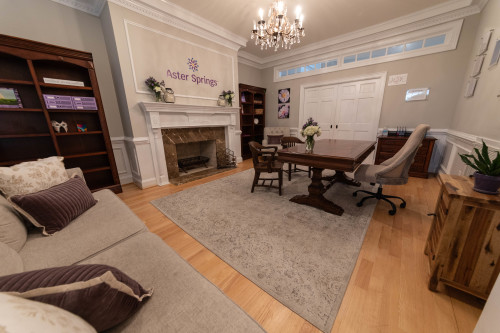






Aster Springs Richmond - Manakin-Sabot
Treatment Focus
You can get treatment for eating disorders at this center, helping you navigate symptoms, build coping tools, and restore your physical health under expert care.
Primary Level of Care
Offering intensive care with 24/7 monitoring, residential treatment is typically 30 days and can cover multiple levels of care. Length can range from 14 to 90 days typically.
Claimed
Recovery.com has connected directly with this treatment provider to validate the information in their profile.
Treatment Focus
You can get treatment for eating disorders at this center, helping you navigate symptoms, build coping tools, and restore your physical health under expert care.
Primary Level of Care
Offering intensive care with 24/7 monitoring, residential treatment is typically 30 days and can cover multiple levels of care. Length can range from 14 to 90 days typically.
Provider's Policy
We are in-network with multiple insurance providers and accept out-of-network benefits from other major insurance companies. We also accept self-pay.
Aster Springs Richmond - Manakin-Sabot
Aster Springs Richmond - Manakin-Sabot
About Aster Springs Richmond - Manakin-Sabot
Aster Springs in Manakin-Sabot offers specialized treatment for eating disorders through residential, partial hospitalization program (PHP), and intensive outpatient program (IOP) options. Their residential program is for women 18 years and older, while their outpatient programs are offered to adults of any gender, and also offer transitional living. Clients work closely with experienced and licensed staff, with personally tailored recovery plans addressing each individual's unique needs.
Aster Springs can offer treatment for individuals struggling with anorexia nervosa, avoidant/restrictive food intake disorder (ARFID), binge eating disorder (BED), bulimia nervosa, muscle dysmorphia, and other specified feeding or eating disorder (OSFED).
Residential Treatment
The residential treatment program at Aster Springs offers specialized treatment for adult women with disordered eating. They offer a structured routine in a home-like, community setting where clients will work closely with a team of highly credentialed therapists and nutritionists. With a holistic approach and low patient-to-staff ratio, clients receive multi-dimensional treatment through individual, group, experiential, and expressive therapies. Their continuum of care ensures patients continue with the appropriate level of aftercare once they have completed their residential program, including outpatient and transitional living services.
Continuum of Care
In addition to residential care, their partial hospitalization program (PHP) and intensive outpatient program (IOP) is offered to adult men and women. Clients in PHP will participate in treatment for 6 hours per day, 5 days per week and can live in one of the several nearby housing options provided by Aster Springs. IOP consists of treatment for 3 hours per day, 3-5 days per week and offers daytime and evening programs. Clients in outpatient programs will participate in individual, group, and family therapy, and will also prepare meals and practice learned skills with the support of professionals.
Individualized Treatment
As part of their individualized treatment, the credentialed therapists and staff use holistic and evidence-based treatment methods. Some of these therapies may include acceptance and commitment therapy (ACT), exposure and response prevention therapy (ERP), nutrition therapy, and yoga. Their tranquil campus is located on 20 acres of peaceful and serene land, with luxury amenities in an environment conducive to healing.

Center Overview
Treatment Focus
You can get treatment for eating disorders at this center, helping you navigate symptoms, build coping tools, and restore your physical health under expert care.
CARF Accredited
CARF stands for the Commission on Accreditation of Rehabilitation Facilities. It's an independent, non-profit organization that provides accreditation services for a variety of healthcare services. To be accredited means that the program meets their standards for quality, effectiveness, and person-centered care.

Insurance Accepted
Cash Pay Rates
Estimated Cash Pay Rate
Center pricing can vary based on program and length of stay. Contact the center for more information. Recovery.com strives for price transparency so you can make an informed decision.
Levels of Care






Your Care Options
Specializations
Eating Disorders
An eating disorder is a long-term pattern of unhealthy behavior relating to food. Most people with eating disorders have a distorted self-image.
Who We Treat
Men and Women
Men and women attend treatment for addiction in a co-ed setting, going to therapy groups together to share experiences, struggles, and successes.
Approaches
Personalized Treatment
The specific needs, histories, and conditions of individual patients receive personalized, highly relevant care throughout their recovery journey.
Experiential
Expressive tools and therapies help patients process past situations, learn more about themselves, and find healing through action.
Holistic
A non-medicinal, wellness-focused approach that aims to align the mind, body, and spirit for deep and lasting healing.
Evidence-Based
A combination of scientifically rooted therapies and treatments make up evidence-based care, defined by their measured and proven results.
Therapies
1-on-1 Counseling
Patient and therapist meet 1-on-1 to work through difficult emotions and behavioral challenges in a personal, private setting.
Family Therapy
Family therapy addresses group dynamics within a family system, with a focus on improving communication and interrupting unhealthy relationship patterns.
Acceptance and Commitment Therapy (ACT)
This cognitive behavioral therapy teaches patients to accept challenging feelings and make the appropriate changes to reach personal goals.
Nutrition Counseling
Nutritious food helps patients heal from within, setting them up for mental and bodily wellness as they learn about healthy eating.
Experiential Therapy
With this approach, patients heal by doing. Therapists help patients process difficult emotions to speak, using guided activities like art or dance.
Conditions We Treat
Post Traumatic Stress Disorder
PTSD is a long-term mental health issue caused by a disturbing event or events. Symptoms include anxiety, dissociation, flashbacks, and intrusive thoughts.
Anxiety
Anxiety is a common mental health condition that can include excessive worry, panic attacks, physical tension, and increased blood pressure.
Depression
Symptoms of depression may include fatigue, a sense of numbness, and loss of interest in activities. This condition can range from mild to severe.
Trauma
Some traumatic events are so disturbing that they cause long-term mental health problems. Those ongoing issues can also be referred to as "trauma."
Eating Disorders
An eating disorder is a long-term pattern of unhealthy behavior relating to food. Most people with eating disorders have a distorted self-image.
Substances We Treat
Co-Occurring Disorders
A person with multiple mental health diagnoses, such as addiction and depression, has co-occurring disorders also called dual diagnosis.
Languages
Aftercare
Care Designed for Your Needs
Personal Amenities
Amenities
Activities
Yoga
Yoga is both a physical and spiritual practice. It includes a flow of movement, breathing techniques, and meditation.






